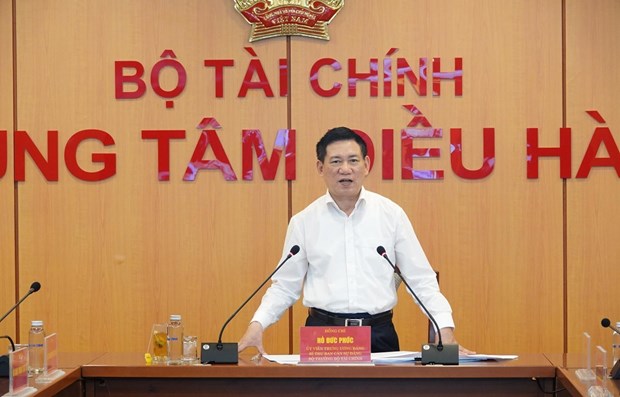Rising prices, budget concerns slow public investment disbursement
 The Ministry of Finance held a meeting with Vinh Phuc, Phu Yen, Khanh Hoa, Binh Thuan, and Binh Phuoc provinces to seek solutions for accelerating public investment disbursement in 2022. (Photo: Vietnamplus)
The Ministry of Finance held a meeting with Vinh Phuc, Phu Yen, Khanh Hoa, Binh Thuan, and Binh Phuoc provinces to seek solutions for accelerating public investment disbursement in 2022. (Photo: Vietnamplus)The Minister of Finance, Ho Duc Phoc said that the disbursement rate of public investment in first four months of the year was low, hitting only 18.48% of the plan assigned by the Prime Minister.
Complicated and overlapping regulations
At a meeting on May 18 with provinces (Vinh Phuc, Phu Yen, Khanh Hoa, Binh Thuan, Binh Phuoc) to discuss removing barriers to promote the disbursement of public investment capital, the Ministry of Finance emphasized that one of the problems is that Vietnam’s economy declined in the wake of the COVID-19 pandemic.
Currently, the whole country is entering the economic recovery phase, in which key solutions include increasing public investment and focusing on attracting investment from non-State capital sources.
However, data from the Ministry of Finance indicates that at the end of April, the country only had 7 ministries and 8 localities with disbursement rate of over 25%. The remaining 43/51 ministries and 28/63 localities carried disbursement rates of less than 17% (including 17 ministries and sectors that have not yet disbursed capital plans).
Explaining the reasons behind the above delays, representatives said there were still problems in institutional and legal regulations on public investment.
Vu Viet Van, Vice Chairman of Vinh Phuc Provincial People's Committee, blamed the inflexibility of annual public investment plan of projects using local budget capital.
In addition, Van also said that compensation for land clearance into independent projects only applies to important national group A projects. The remaining projects (groups B, C) are not compensated for land clearance at the project implementation stage. This affects the implementation progress and disbursements as construction sites are not available.
Regarding the investment preparation agency, Van stated that according to the provisions of the Law on Public Investment, the specialized agency or the District People's Committee proposed investment policy. But the decision on investment policy was handed over to the Project Management Unit as the investor. Thus two agencies are involved in project implementation decisions at the investor stage. This leads to unneeded complexity when making settlement payments, extending the project implementation time.
Representatives of localities also shared other common problems such as COVID-19 that is still impacting socio-economic recovery, development progress as well as the implementation of projects.
Moreover, construction material and supply prices have skyrocketed in the recent months, causing enterprises and contractors to delay or suspend construction. Projects must adjust policy and total investment revenues to match the increases.
Sustained effort to uncouple
Heeding local concerns, the Minister of Finance emphasized that the requirements of economic recovery and development necessitate the disbursement of public investment in accordance with the plan. This would ensure GDP growth while addressing employment, increasing budget revenues. In the minister’s words, he called it a cross-cutting policy.
According to the Minister, all problems need to be placed on the table so that the most appropriate solutions can be discussed and solutions found.
“If the contractor stops the project due to the high price of raw materials, that means all the ground that was gained is lost. Thus contractors can’t move forward without other solutions, and the spiraling effect of increasing costs compounds the difficulties to start up again. When enterprises find themselves in a difficult situation, unable to fund startup, there is also risk for State agencies. For example, the amount of capital advanced by the State to enterprises (when signing contracts) may not be recovered, the Minister noted./.













